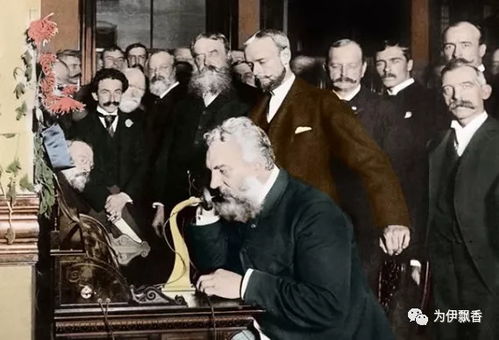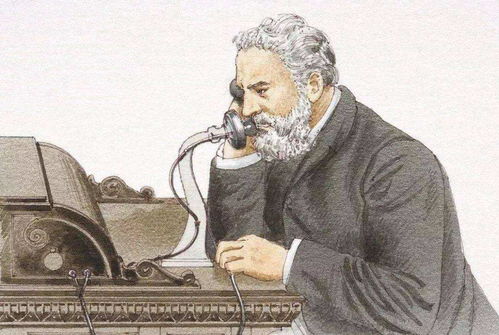Reading "Alexander · Graham · Bell" in English

在人类的通讯史上,有一个名字永远闪耀着光辉,他就是亚历山大·格雷厄姆·贝尔(Alexander Graham Bell)。作为电话的发明者,贝尔不仅改变了人类的交流方式,还极大地推动了社会的进步与发展。当我们用英语去阅读和理解贝尔的一生时,不仅能感受到他那令人钦佩的创新精神,还能深刻理解他对人类文明的巨大贡献。

Early Life and Family Background
Bell was born on March 3, 1847, in Edinburgh, Scotland. His father, Alexander Melville Bell, was a renowned elocutionist and professor of phonetics, while his mother, Eliza Grace Symonds Bell, was an accomplished pianist and painter. Such a family environment naturally nurtured Bell's interest in both sound and communication.
In 1870, the Bell family moved to Canada, and shortly thereafter to Boston, USA. It was in this new country that Bell's inventive talents truly blossomed. His fascination with the human voice and its transmission led him to explore various ways to enhance and replicate sound.
Educational Journey and Initial Interests
Bell received his early education at home under the guidance of his father, who had a profound influence on his scientific curiosity. Later, he attended the Royal High School in Edinburgh and then studied at the University of Edinburgh and the University of London. His initial academic pursuits were in biology and teaching, but it wasn't long before he shifted his focus to the emerging field of electrical engineering.
Bell's passion for helping the deaf also played a significant role in his early work. His mother and wife, Mabel Hubbard, both had hearing impairments, which inspired him to develop better teaching methods and assistive devices for the deaf community.
The Invention of the Telephone
In 1874, Bell and his family moved to Boston, where he was appointed as a professor of vocal physiology at Boston University. It was during this time that Bell began experimenting with transmitting vocal sounds electrically. He was particularly intrigued by the possibility of transmitting the human voice over a wire.
Despite facing skepticism and competition from other inventors, Bell persevered. In 1876, with the help of his assistant Thomas Watson, Bell successfully transmitted the first clear, intelligible sentence: "Mr. Watson, come here, I want to see you." This groundbreaking achievement not only earned Bell the credit for inventing the telephone but also laid the foundation for the telecommunications industry.
Bell's telephone patent was granted on March 7, 1876, and soon after, the Bell Telephone Company was established. The company quickly grew, bringing telephone service to homes and businesses across the United States and eventually the world.
Bell's Other Innovations and Contributions
While the telephone is undoubtedly Bell's most famous invention, he was also a prolific inventor and scientist with a wide range of interests. Bell's other inventions include the audiometer, an instrument for measuring hearing sensitivity; the photophone, which transmitted speech and music on a beam of light; and the hydrofoil, a high-speed watercraft that revolutionized marine travel.
Bell's contributions to science and education went beyond his inventions. He was a fervent advocate for deaf education and helped establish schools and programs to support the deaf community. He also served as president of the National Geographic Society and was a founding member of the American Neurological Association and the National Academy of Sciences.
The Legacy of Alexander Graham Bell
Bell's legacy is felt around the world, as the telephone has become an indispensable tool in modern communication. His innovations have had a profound impact on business, education, healthcare, and countless other aspects of daily life. The Bell Telephone Memorial in Brantford, Ontario, Canada, and the Alexander Graham Bell National Historic Site in Baddeck, Nova Scotia, Canada, are both testaments to his life and work.
Moreover, Bell's innovative spirit and commitment to science and education continue to inspire generations of inventors, engineers, and scientists. His example demonstrates the importance of perseverance, curiosity, and the willingness to take risks in pursuit of groundbreaking discoveries.
Bell's Impact on Global Communication
The telephone's impact on global communication cannot be overstated. Before the telephone, communication between distant locations was slow and unreliable, often relying on written letters or telegraph messages. The telephone made it possible for people to converse instantly, regardless of distance, revolutionizing personal and professional relationships.
As the telephone network expanded, so did the reach of information and ideas. The ability to communicate quickly and easily led to increased collaboration, innovation, and economic growth. The telephone also played a crucial role in the development of other telecommunications technologies, such as the radio, television, and the internet.
Today, the telephone remains a fundamental aspect of modern communication, with billions of people worldwide relying on it for personal and professional interactions. While many other communication technologies have emerged over the years, the telephone remains a staple of daily life, a testament to Bell's ingenuity and foresight.
Bell's Personal Beliefs and Philosophy
Bell was a deeply spiritual man who believed in the power of knowledge and innovation to improve the human condition. He was a committed Christian and often spoke about the importance of using technology to serve humanity and promote peace. Bell was also a great admirer of the sciences and arts, believing that they were both essential for a well-rounded education and a fulfilling life.
Bell's philosophy was rooted in a belief in the innate goodness of humanity and the potential for individuals to make a positive impact on the world. He encouraged young people to pursue their passions, take risks, and never be content with mediocrity. Bell's own life was a shining example of this philosophy, as he continuously pushed the boundaries of knowledge and innovation.
Conclusion
Alexander Graham Bell was a visionary inventor and scientist whose contributions to the world of telecommunications are immeasurable. The telephone he invented has transformed communication and society in ways that were once thought impossible. Bell's other inventions and contributions to science and education have also had a lasting impact on the world.
Reading about Bell's life and work in English allows us to delve deeper into his thoughts, achievements, and legacy. It is a fascinating journey through the mind of a genius who dedicated his life to improving the human condition. Bell's story is one of innovation, perseverance, and a commitment to making the world a better place. As we continue to communicate and innovate in the 21st century, let us remember the man who made it all possible: Alexander Graham Bell.
- 上一篇: 超火神曲歌词大揭秘:“就是这个味儿,这个屯儿”!
- 下一篇: 轻松学会!正版腾讯QQ下载指南
-
 Merry Christmas in English资讯攻略12-02
Merry Christmas in English资讯攻略12-02 -
 The Art of Saying 'Where, Where' in English资讯攻略10-30
The Art of Saying 'Where, Where' in English资讯攻略10-30 -
 How to Say 'Quot 无所谓 Quot in English?资讯攻略01-16
How to Say 'Quot 无所谓 Quot in English?资讯攻略01-16 -
 How do you say 'let it be' in English?资讯攻略11-04
How do you say 'let it be' in English?资讯攻略11-04 -

-
 What does "wearing" mean in English?资讯攻略12-04
What does "wearing" mean in English?资讯攻略12-04












